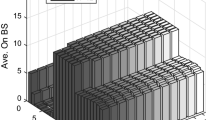Abstract
Wireless heterogeneous networks (HetNet) are continuing to bring the industrial networks and intelligent systems more smarter. In heterogeneous networks, energy saving is vital for a sustainable network development, which can be achieved through using various spectrum allocation schemes. It is significant that energy-efficient(EE) spectrum allocation should consider large-scale user behavior, which characterizes the macro BSs that guarantee traffic requirements in non-hotspot regions and the micro BSs that guarantee traffic requirements in hotspot regions. This paper presents four bandwidth allocation schemes for the (a) orthogonal, (b) shared, (c) shared/orthogonal frequency band allocation (SOFA) and (d) shared/orthogonal frequency band allocation under micro BSs transmit power change (SOFA-MPC), where the large-scale user behavior is taken into account. Then we give closed-form formulas of bandwidth allocation schemes which establish the quantitative relationship between the large-scale user behavior and bandwidth allocation strategy. Both theoretical and simulation results show that SOFA scheme is effective in guaranteeing both the demands of the large-scale user behavior and keeping low power consumption than orthogonal allocation scheme and shared scheme. SOFA-MPC scheme has a close relation with the large-scale user behavior too. We give the variation range of transmit power variation bias θ in all circumstances. Simulation and analytical results show that the SOFA-MPC EE is higher than the SOFA EE within the limits of θ.





Similar content being viewed by others
References
Study on Small Cell enhancements for E-UTRA and E-UTRAN. 3GPP TR 36.842 v0.2.0 (2013.5)
Hoymann C, Larsson D, Koorapaty H, Fu CJ (2013) A lean carrier for LTE. IEEE Commun Mag 51(2):74–80
Zhang X, Yu R, Zhang Y, Gao Y, Im M, Cuthbert L, Wang W (2014) Energy-efficient multimedia transmissions through base station co-operation over heterogeneous cellular networks exploiting user be-havior. IEEE Wireless Commun 21(4)
Zhang X, Zhang Y, Yu R, Wang W, Guizani M (2014) Enhancing spectral-energy efficiency for lte-advanced heterogeneous networks: a users social pattern perspective. IEEE Wireless Commun 21(2)
Ge X, Han T, Zhang Y, Mao G, Wang C-X, Zhang J, Yang B, Pan S (2014) Spectrum and energy efficiency evaluation of two-tier femtocell networks with partially open channels. IEEE Trans Veh Technol 63(3):1306–1319
Singh S, Dhillon HS, Andrews JG (2013) Offloading in heterogeneous networks: modeling, analysis, and design insights. IEEE Trans Wireless Commun 12(5):2484–2497
Wang Y, Shi C, Wang T, Feng Z (2012) A non-cooperative game approach for bandwidth allocation in heterogeneous wireless net-works. In: IEEE VTC’ 12, pp 1–5
Tan XJ, Li L, Guo W (2012) Bargaining-based spectrum sharing for cognitive radio networks with incomplete information. In: IEEE GLOBE-COM’12, pp 1198–1204
Yong X, Tim F, Irene M, Luiz DA, Linda D (2012) Spatial spectrum sharing-based carrier aggregation for heterogeneous networks. In: IEEE GLOBECOM??12, pp 2591–2596
Yaacoub E, Ghazzai H, Alouini M-S, Abu-Dayya A (2013) Achieving energy efficiency in LTE with joint D2D communications and green networking techniques. In: IWCMC, 2013 9th international, pp 270–275
Quek YSS, Kountouris TQS, Hyundong Shin M (2013) Energy efficient heterogeneous cellular networks. IEEE J Sel Areas Commun 31(5):840–850
Liu Y, Xie S, Zhang Y, Yu R, Leung V (2012) Energy-efficient spectrum discovery for cognitive radio green networks. ACM/Springer Mobile Netw Appl MONET) 17(1):64–74
Mahmud A, Lin Z, Hamdi K (2014) On the energy efficiency of fractional frequency reuse techniques. IEEE WCNC, to appear
Zhang Y, Yu R, Yao W, Xie S, Xiao Y, Guizani M (2011) Home M2M networks: architectures, standards, and QoS improvement. IEEE Commun Mag 49(4):44–52
Zhang Y, Xiao Y, Leung V (2009) Energy management analysis and enhancement in IEEE 802.16e WirelessMAN. IEEE Trans Veh Technol 58(7):3738–3752
Chandhar P, Das SS (2014) Area spectral efficiency of co-channel deployed OFDMA femtocell networks. IEEE Trans Wireless Commun 13(7):3524–3538
Dhillon HS, Ganti RK, Baccelli F, Andrews JG (2012) Modeling and analysis of K-Tier downlink heterogeneous cellular networks. IEEE J Sel Areas Commun 30(3):550–560
Singh S, Andrews JG (2014) Joint resource partitioning and offloading in heterogeneous cellular networks. IEEE Trans Wireless Commun 13(2):888–901
Acknowledgments
This work is supported by the National Natural Science Foundation of China (NSFC) under grant 61372114, by the National 973 Program of China under grant 2012CB316005, by the New Star in Science and Technology of Beijing Municipal Science & Technology Commission (Beijing Nova Program), and by Beijing Higher Education Young Elite Teacher Project (No.YETP0434). Part of this work was presented at ChinaCom 2014, MaoMing, China.
Author information
Authors and Affiliations
Corresponding author
Rights and permissions
About this article
Cite this article
Zhang, X., Yang, K., Wang, P. et al. Energy Efficient Bandwidth Allocation in Heterogeneous Wireless Networks. Mobile Netw Appl 20, 137–146 (2015). https://doi.org/10.1007/s11036-014-0558-z
Published:
Issue Date:
DOI: https://doi.org/10.1007/s11036-014-0558-z





